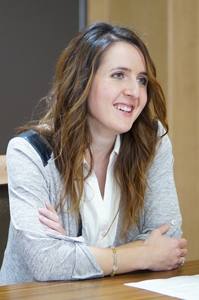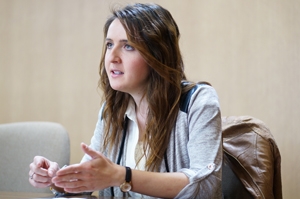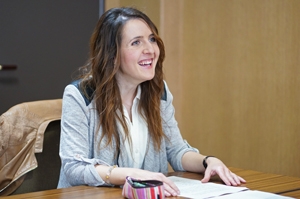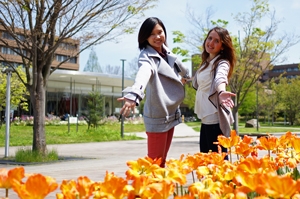
Katalin Dalmi (Hungary)
○2013.4~2014.3 Research Student
○2014.4~ Doctoral Program, Graduate School of Letters
1. Why did you choose Hiroshima University?
I studied Japanology (Japanese language, literature, history, and culture) for three years in a university in Hungary. I continued on to graduate school in Hungary, researching mainly Japanese literature. I had an interest in Japan since I was a child, and because I love reading, I had a considerable interest in Japanese literature. It is still difficult to find specialized books on Japanese literature in Hungary. “I want to read more specialized books and research Japanese literature in more depth!” As these feelings grew, I decided to study abroad in Japan again.
I had studied abroad in Japan twice before Hiroshima University. The first time was in 2008; That was a short six-week program. I took classes on Japanese language and culture. I took a trip around Japan after the program and it was the first time I visited Hiroshima. The second time was in 2010; I studied at Oita University for one year. After completing my masters in Hungary, I applied for a scholarship from Japan’s Ministry of Education, Culture, Culture, Sports, Science, and Technology. I was able to receive the scholarship and study at Hiroshima University.
The reason why I wanted to study at Hiroshima University is that I wanted to conduct research under Mrs. Nobuko Arimoto. She is an expert on modern Japanese culture. She has written articles on Haruki Murakami, who is my subject of research. I emailed her asking if she could become my mentor, and she kindly accepted.
2. Could you explain your research in detail?
I am mainly researching modern Japanese literature through books and comparative literature research. My subject of research is the literature of the world-renowned writer, Haruki Murakami. He has played a major role in sharing Japanese literature and culture from his popularity around the world. I am researching his literature’s influence on post modernism and magic realism as well as how Murakami expresses his views on problems such as “Bubble Society” “Individual vs Society” and “Identity”.
I have been focusing my research on his early works, but I would like to start researching his literature from the 1990s soon. For example, the infamous Tokyo subway sarin attack occured the 1990s. Murakami wrote an interview book titled “Underground” about this incident. Also two years before this book, he wrote a long novel called “The Wind-Up Bird Chronicle”, I am thinking about researching these works in the near future.
Including Hungary, there is not much research done in Europe concerning Japanese literature. I want to participate in academic conferences in Europe and share my research results. I also want to translate research done in Europe and share it in Japan.

3. When you came to Japan, how was it? How was the guidance from your mentor?
When I first arrived at Hiroshima University, I was insecure because I wasn’t accustomed to many things. I needed to get used to how to prepare for seminars and how to write research papers because they were different from the Hungarian way. Fortunately I was surrounded by kind students and tutor that helped me whenever I needed assistance. By six months I was able to find research material and write research papers on my own with ease. I am so grateful that the students in my research study room proofread my papers to check my Japanese. When I was a research student, I also attended Japanese classes for international students to study Japanese and make new friends.
My mentor Mrs. Arimoto is very nice; she helps me with my research as well as with other concerns in everyday life. Once or twice a month we have one-to-one meetings about my research and study sessions. During study sessions, professors and students that specialize in Japanese literature get together to present their research. The study sessions are always enlightening as I acquire new perspectives.
I had a memorable day trip to Miyajima with Mrs. Arimoto. We saw a beautiful view of Seto Inland Sea when we went hiking and also ate delicious sea eel rice. This was shortly after I arrived at Hiroshima University so I was very touched by Mrs. Arimoto’s thoughtfulness.
4. What is the atmosphere like in your faculty study room?
In a word, my faculty study room has a homelike atmosphere. Not only do we study together, but we also have coffee and snacks together. It’s very comfortable. Half of the students are Chinese and the other half are Japanese, and there was one student from Spain until last October. When it’s sunny we have barbeques together, and we also had a Christmas party. Of course, all the literature and equipment that I need for research is easily accessible.

5. Please allow me to ask a question about your future goals. What kind of work would you like to do?
I would like to continue research as a university professor while doing translation jobs. I want to share the charm of Japan to Hungarians by translating Japanese books and novels into Hungarian. There are many young Hungarians that are interested in Japan so I really would like to provide them with more Japanese books. It would be amazing if my future job and current research come together.
6. Do you have some advice for your juniors who wish to study abroad in Japan?
I think Hiroshima University is an ideal environment in which to devote yourself to your research. Other than your research, it is just as important to make many friends while studying abroad. I would tell you to interact with students not only from Japan, but with students from all over the world. As you experience many different cultures, your perspective of the world will start to change. I think it’s great to take classes in your own research area and also classes that are outside of your research area.



 Home
Home





